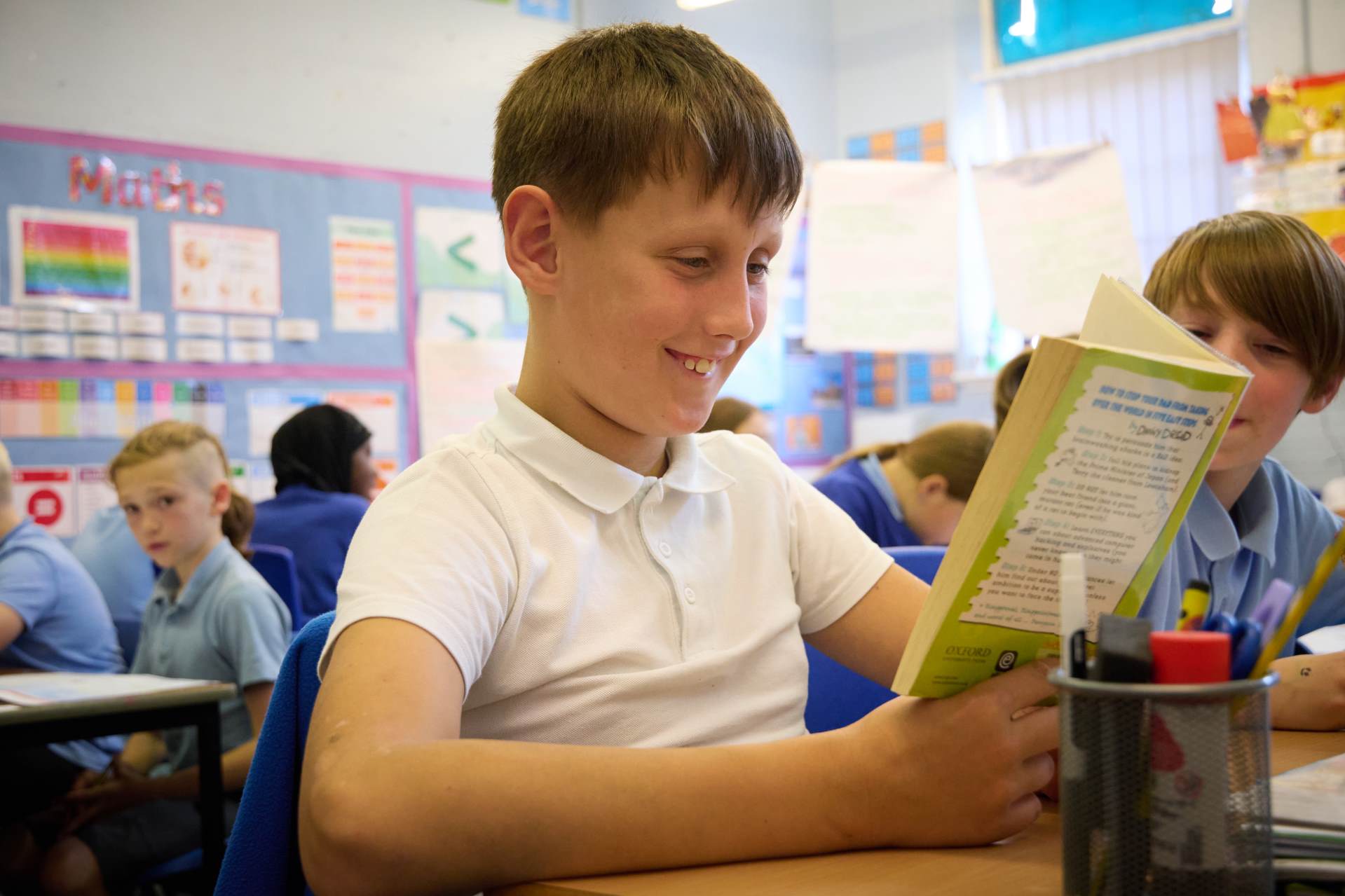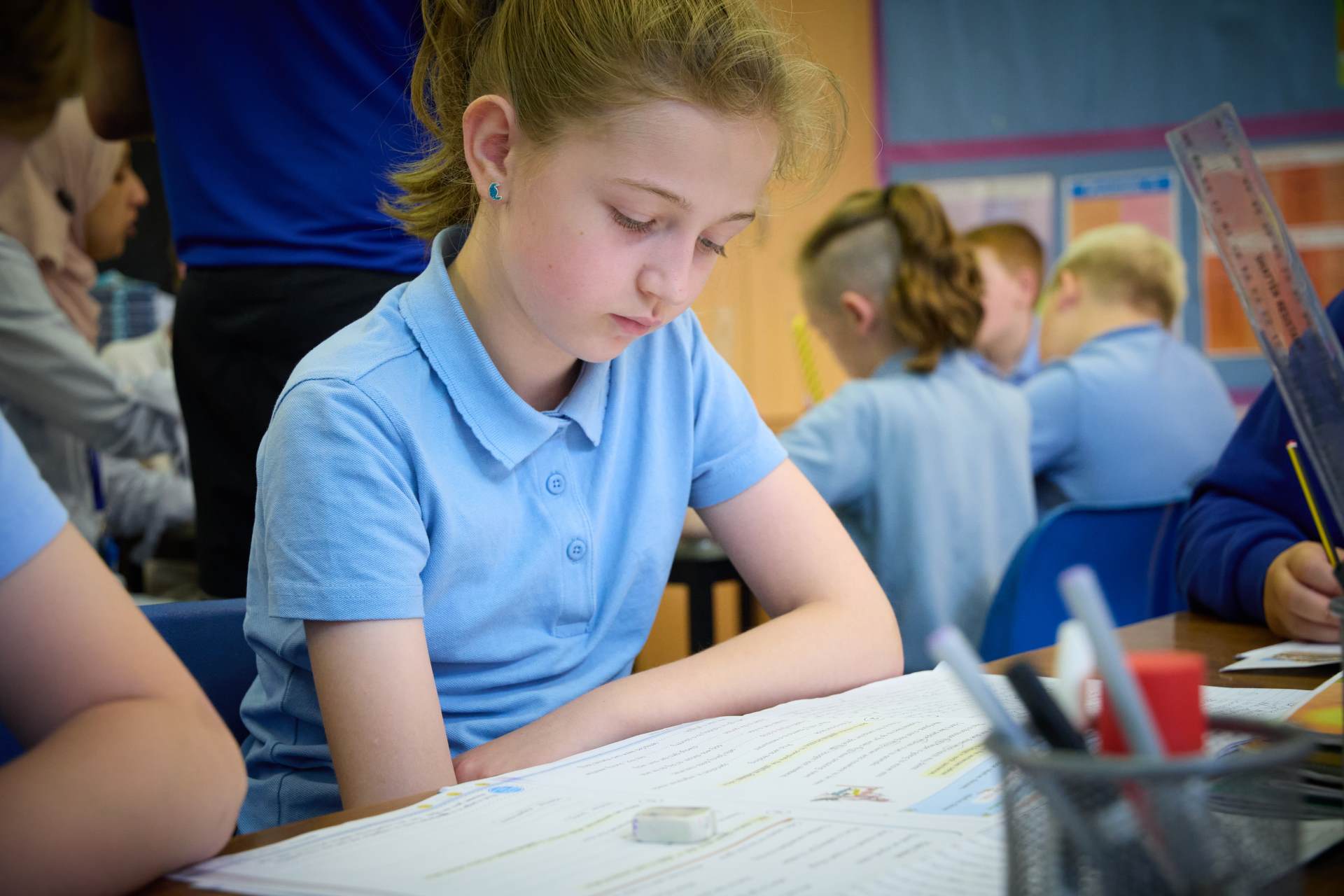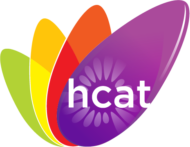Reading

Intent
At Wheeler Primary School, we recognise that reading holds a central place in both education and wider society. It is the foundation upon which pupils build their ability to communicate clearly, understand others, and express their ideas with confidence. Reading is not only a crucial skill for academic achievement but also a powerful tool for personal growth—culturally, emotionally and socially.
We give reading the highest priority across our school. It is woven into every aspect of the curriculum and is seen as the key that unlocks learning in all subject areas. From the moment children join us in the Early Years Foundation Stage, they are immersed in a rich reading environment filled with carefully chosen, high-quality texts that reflect a diverse range of themes, cultures, and voices. These texts are selected to build vocabulary, stimulate curiosity, and promote a genuine love of reading.
At Wheeler, our reading curriculum is fully aligned with the EYFS Framework and the National Curriculum. We are committed to ensuring that all children, regardless of their background, starting point, or individual needs, become fluent, confident, and enthusiastic readers as quickly as possible. We aim to develop children who read not just to learn, but who also choose to read for enjoyment, inspiration, and discovery.
We believe that reading opens up the world. It empowers pupils to access information, engage with different perspectives, and participate fully in their education and community. Our intent is to enable every child to become an independent reader who can confidently comprehend and evaluate a wide range of texts.
Reading also underpins our approach to writing: every writing unit is introduced with a high-quality text that acts as a stimulus to excite and engage learners. This approach strengthens vocabulary development, supports comprehension, and gives children strong models of authorial voice and structure.
Our early reading provision is underpinned by a systematic and research-informed approach to teaching both word recognition and language comprehension. We follow the Little Wandle Letters and Sounds Revised programme throughout EYFS and Key Stage 1, and continue to support pupils beyond this where needed to ensure no child is left behind in their reading journey.
By the time pupils leave Wheeler Primary, they will have enjoyed a wide and balanced reading experience including fiction, non-fiction, and poetry. They will have built the skills, knowledge, and confidence needed to thrive in the next stage of their education—and, most importantly, they will have developed a lasting love of reading that stays with them for life.
Spoken language
The national curriculum for English reflects the importance of spoken language in pupils’ development across the whole curriculum – cognitively, socially and linguistically. Spoken language underpins the development of reading and writing.
The quality and variety of language that pupils hear and speak is vital for developing their vocabulary and grammar, and their understanding of reading and writing. Therefore teachers at Wheeler ensure the continual development of pupils’ confidence and competence in spoken language and listening skills.
At Wheeler we aim to support pupils in developing a capacity to explain their understanding of books and other reading material, and to prepare their ideas before they write. Pupils are assisted in making their thinking clear to themselves, as well as to others. Teachers ensure that pupils build secure understanding by using discussion to probe and remedy misconceptions. Pupils are also taught to understand and use the conventions of discussion and debate, at an age appropriate level.
Implementation
Phonics and Early Reading
At Wheeler Primary we have the highest expectation that children will become confident, fluent and proficient readers through our consistent implementation of our chosen Systematic Synthetic Phonics Programme – Little Wandle Letters and Sounds Revised. We follow this programme throughout EYFS and KS1 and until the children have the skills and fluency to access age-appropriate texts.
Our phonics approach delivers a high-quality systematic synthetic phonics programme of proven effectiveness, followed with rigour and fidelity so that children are taught consistently to use phonics as the route to reading unknown words. The pace of the phonics programme is maintained through high quality teaching and same day intervention, so that children become confident, fluent and independent readers. Children’s reading books show a cumulative progression in phonics knowledge that match the grapheme-phoneme correspondences they know to support decoding skills and building fluency.
Foundations for phonics in Nursery
We provide a balance of child-led and adult-led experiences for all children that meet the curriculum expectations for ‘Communication and language’ and ‘Literacy’.
These include:
- sharing high-quality stories and poems daily
- learning a range of nursery rhymes and action rhymes in line with Little Wandle
- activities that develop focused listening and attention, including oral blending
- attention to high-quality language.
We ensure Nursery children are well prepared to begin learning grapheme-phoneme correspondences (GPCs) and blending in Reception.
Daily phonics lessons in Reception and Year 1
- We teach phonics for 30 minutes a day. In Reception, we build from 10-minute lessons, with additional daily oral blending games, to the full-length lesson as quickly as possible. Each Friday, we review the week’s teaching to help children become fluent readers.
- Children make a strong start in Reception: teaching begins in Week 2 of the Autumn term.
We follow the Little Wandle Letters and Sounds Revised expectations of progress:
- Children in Reception are taught to read and spell words using Phase 2 and 3 GPCs, and words with adjacent consonants (Phase 4) with fluency and accuracy.
- Children in Year 1 review Phase 3 and 4 and are taught to read and spell words using Phase 5 GPCs with fluency and accuracy.
Daily Keep-up lessons ensure every child learns to read
- Any child who needs additional practice has daily Keep-up support, taught by a fully trained adult. Keep-up lessons match the structure of class teaching, and use the same procedures, resources and mantras, but in smaller steps with more repetition, so that every child secures their learning.
- We timetable daily phonics sessions for any child in Year 2 and above who is not fully fluent at reading or has not passed the Phonics Screening Check. These children urgently need to catch up, so the gap between themselves and their peers does not widen. We use the Rapid Catch-up assessments to identify the gaps in their phonic knowledge and teach to these using the Rapid Catch-up resources – at pace.
- These short, sharp lessons last 15-20 minutes daily and have been designed to ensure children quickly catch up to age-related expectations in reading.
Teaching Reading: Reading Practice Sessions Daily
We teach children to read through reading practice sessions daily. These:
- are taught by a fully trained adult to small groups of children
- use books matched to the children’s secure phonic knowledge using the Little Wandle Letters and Sounds Revised assessments and book matching grids
- are monitored by the class teacher, who rotates and works with each group on a regular basis.
- have a clear focus, so that the demands of the session do not overload the children’s working memory. The reading practice sessions have been designed to focus on three key reading skills:
- decoding
- prosody: teaching children to read with understanding and expression
- comprehension: teaching children to understand the text.
- In Reception these sessions start in Autumn 2. Children who are not yet decoding have daily additional blending practice in small groups, so that they quickly learn to blend and can begin to read books.
- In Year 2 and KS2, we continue to teach reading in this way for any children who still need to practise reading with decodable books before moving onto our fluency programme.
Home Reading
- The decodable reading practice book is taken home to ensure success is shared with the family.
- Reading for pleasure books also go home for parents to share and read to children. Children select their own reading for pleasure book from our library to ensure they are interested and motivated by it.
- We use the Little Wandle Letters and Sounds Revised parents’ resources to engage our families and share information about phonics, the benefits of sharing books, how children learn to blend and other aspects of our provision, both online and through workshops.
Ensuring Consistency and Pace of Progress
- Every teacher in our school has been trained to teach reading, so we have the same expectations of progress. We all use the same language, routines and resources to teach children to read so that we lower children’s cognitive load.
- Weekly content grids map each element of new learning to each day, week and term for the duration of the programme.
- Lesson templates, Prompt cards and How to videos ensure teachers all have a consistent approach and structure for each lesson.
- The Reading Leader and SLT regularly monitor and deliver coaching and practice sessions; they use the summative data to identify children who need additional support and gaps in learning.
Whole Class Reading
Until children can read books which contain the appropriate level of vocabulary and comprehension themselves (independent decoding), the skills of Early Language Comprehension and Phonics are taught separately through whole class reading lessons so that pupils are supported to access a broad range of literature. High-quality stories, rhymes and texts are revisited and repeated through the breadth and balance of the planned curriculum and this builds familiarity, reinforces vocabulary, increases emotional connection and deepens understanding. In EYFS and Year one, there is a daily Storytime where adults read aloud to the children, and give time to book talk for the opportunity to understand what is being read as well as listen to excellent use of expression and intonation. Children have a rich, broad and diverse reading diet and are exposed to many genres and a range of authors, as well as high quality non-fiction texts and poetry. There is a heavy emphasis on explicitly teaching and revisiting unfamiliar and new vocabulary to support children’s Early Language Development. In EYFS, children also have a daily ‘Rhyme Time’.
From Year two to Year six, children read every day during ‘Whole Class Reading’ lessons. They have the opportunity to read individually, in pairs or in small groups once unfamiliar or challenging vocabulary has been discussed and the teacher has modelled how the text should be read. Throughout the week, the children read their core text, whilst also exploring a broad range of non-fiction and/or poetry. Once the text has been read, the children engage in taught activity which encompasses the breadth of study as outlined in the national curriculum, including opportunities for drama, recital and comprehension. Learning may be recorded and will often involve completion of a series of questions based on the reading domain skills to ensure the component knowledge has been learnt.
Whole class reading lessons in every year group from Y2 to Y6 at Wheeler use the class text as a stimulus for approaching diverse and complex themes, challenging preconceptions or stereotyped ideas and sensitive subjects in a supported environment. The opportunity is provided for children to explore fiction, poetry and non-fiction texts which develop contextual knowledge and understanding whilst also providing opportunities to support learning in other areas of our wider curriculum.
Our whole class daily reading lesson structure from Y2-6 follows this structure:
Activate background knowledge – Explicit teaching of vocabulary (mainly tier 2) – Fluency – Explicit teaching of skill or strategy (see reading coverage) - Apply – opportunities to apply skills and strategies / text and length
At Wheeler Primary, we have created a positive reading culture whereby children love to read and do so for intrinsic motivation. There is a real buzz around school with both adults and children, with teachers being seen as readers and regularly sharing their own reading choices.
This culture has been developed through:
- Upskilling adults in their subject knowledge of texts
- Reading aloud to children at least once a day
- Well-organised class libraries with a range of age-appropriate high-quality texts
- High priority given to books in our school environment, such as on displays
- Encouraging reading at home. Children take home books that closely match their independent reading abilities (Little Wandle fully decodable or fluency books), but also take home a ‘reading for pleasure’ book from their class library
- Links with the local Library
- Author visits
- Participating in James Reckitt book awards with Hull Library Service
- Reading for pleasure events in school for children to share their love for reading with their families

Impact
A wide range of strategies are used to measure the impact of our reading curriculum. The impact of learning is measured through daily formative and regular summative assessment. Children are assessed against key performance indicators with those who are not achieving in line with expectations being given intervention sessions in order to address any misconceptions and to allow children to progress with their learning.
Subject leaders monitor the effectiveness of the reading curriculum through carrying out regular evaluations and delivering weekly practice and coaching sessions.
By the end of KS1, there is the expectation that all children will be fluent at decoding. Our phonics screen check score has consistently increased after adopting the Little Wandle SSP.
By the end of KS2, we have increasing proportion of children who are able to read with confidence, fluency and good understanding, drawing upon a range of independent strategies to self-monitor and correct. They have an interest in a wide range of reading materials and read spontaneously for enjoyment and pleasure. They read confidently to acquire information and acquire a wide vocabulary, an understanding of grammar and knowledge of linguistic conventions for reading.



